Key takeaways:
- Understanding stage fright involves recognizing it as a common reaction rooted in fear of judgment, which can be transformed into positive energy.
- Identifying personal triggers, like fear of judgment and high stakes, helps manage anxiety and prepare mentally for presentations.
- Thorough preparation, including rehearsal and visualization, enhances performance confidence while creating a soothing environment can reduce stress.
- Implementing positive self-talk transforms doubts into confidence, shifting focus from fear of judgment to the joy of connecting with the audience.
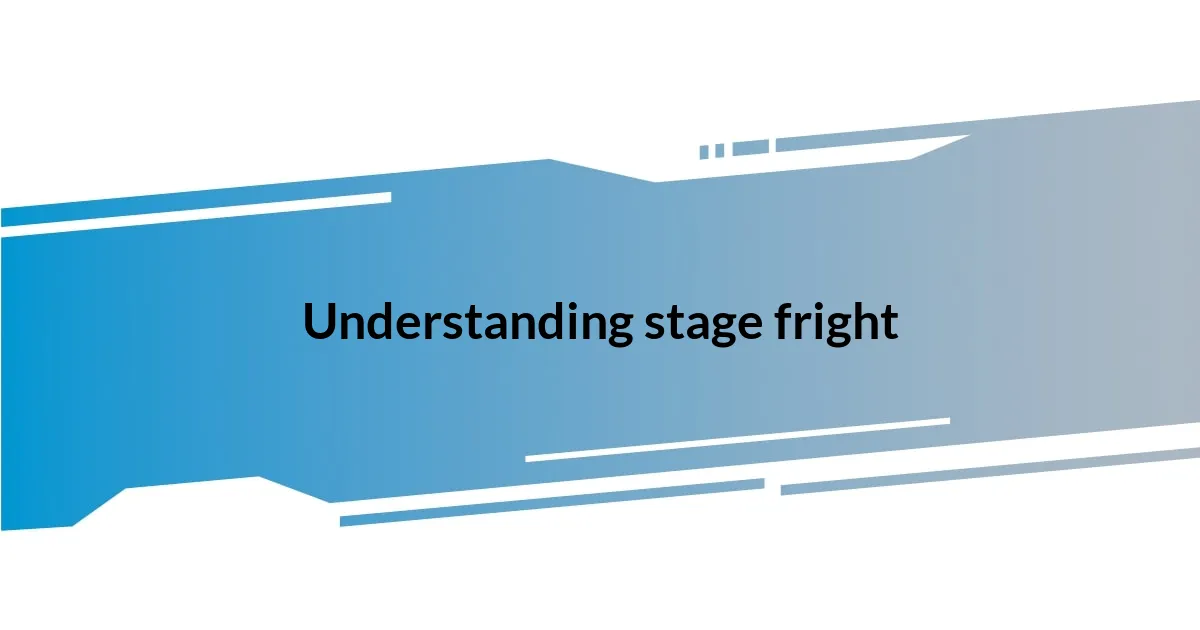
Understanding stage fright
Stage fright, also known as performance anxiety, is that buzz of nerves we feel before stepping into the spotlight. I remember my first public speaking engagement; my palms were sweaty, heart racing, and all I could think was, “What if I forget everything?” It’s a common feeling, but understanding that it stems from a very natural fear of judgment can help ease those nerve-racking moments.
When I look back, I realize stage fright often isn’t just about the performance itself; it can also be linked to the expectations we set for ourselves. Have you ever felt that knot in your stomach before an important presentation? It’s like our brains are telling us to either flee or fight. This pressure can be overwhelming, but identifying that it arises from a desire to connect and share something valuable can shift our perspective.
Interestingly, I’ve found that embracing this fear—rather than resisting it—can be surprisingly liberating. I once overheard someone say, “Nerves mean you care,” and that resonated with me profoundly. Have you noticed that little spark of adrenaline can actually enhance our performance? Understanding stage fright isn’t just about overcoming it; it’s about transforming that energy into something positive and impactful.
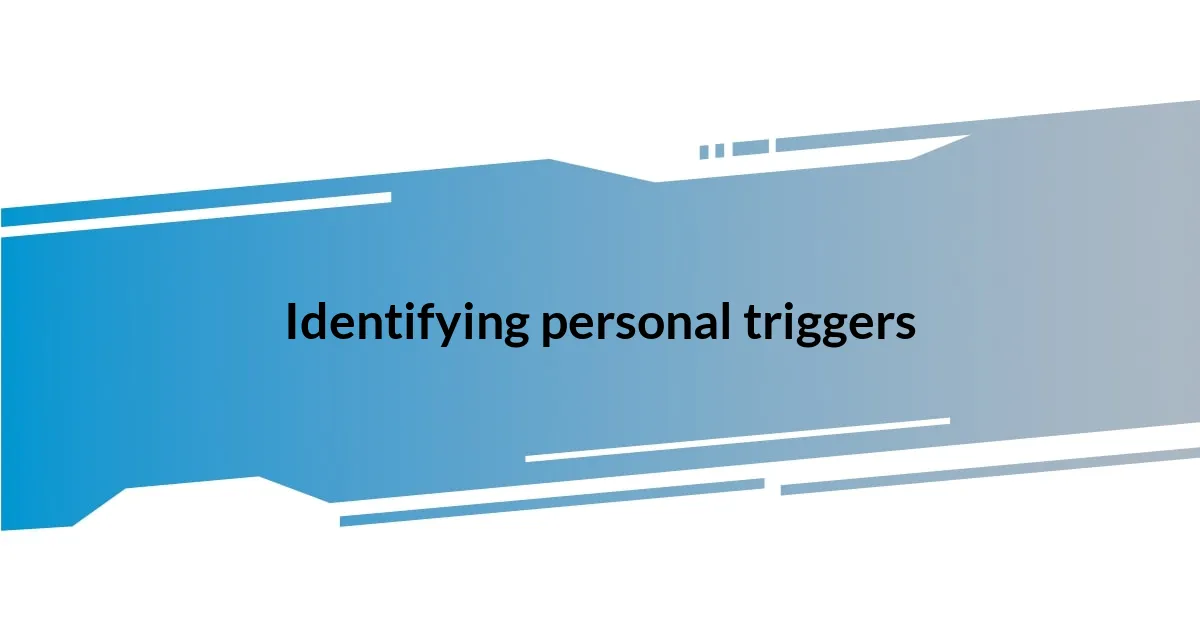
Identifying personal triggers
Identifying personal triggers is a crucial step in managing stage fright effectively. I’ve noticed that certain situations consistently trigger my anxiety. For instance, when I know there will be people I admire in the audience, my nerves spike immediately. Recognizing these specific triggers has helped me prepare mentally for performances and presentations.
Here are some common personal triggers that may resonate with you:
– Fear of judgment: Worrying about what others think can heighten stress.
– High stakes: Aiming for perfection can create intense pressure.
– Previous experiences: Past performances that didn’t go well can leave lingering anxiety.
– Familiar faces: Speaking in front of friends or colleagues might feel more intimidating than strangers.
– Uncertainty: Lack of preparation can trigger self-doubt and anxiety.
By paying attention to those unique stressors, I feel more equipped to face them head-on. Ultimately, this awareness turns my concerns into actionable steps for improvement next time around.
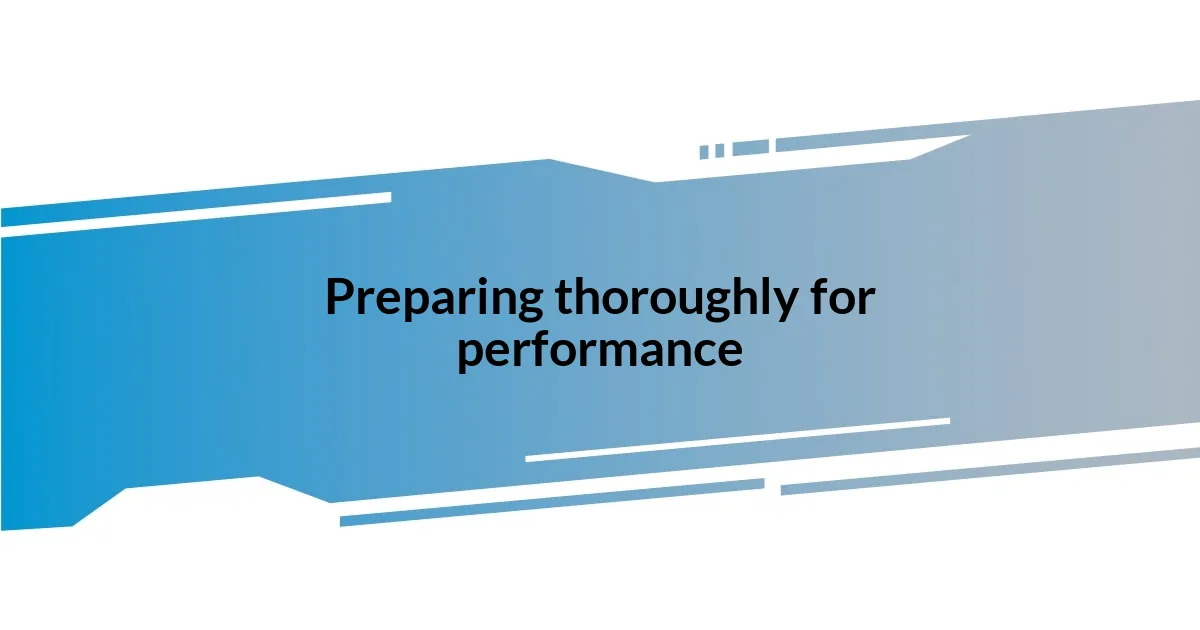
Preparing thoroughly for performance
Preparing thoroughly for a performance can truly make all the difference. In my experience, dedicating ample time to rehearse not only familiarizes me with the material but also builds my confidence. I remember when I prepared for a big presentation—I practiced my delivery so many times that it felt like second nature. The more I practiced, the more I discovered nuances in my speech that I could tweak for better impact, which eased the anxiety I felt leading up to the event.
Another aspect I’ve found vital is envisioning the entire performance. Before I step on stage, I like to close my eyes and visualize each moment, from entering the space to the final applause. It might sound a bit unusual, but imagining myself succeeding has a calming effect. This mental rehearsal prepares me for various scenarios, minimizing surprises that could trigger my nerves. Have you ever tried this approach? It transforms the unknown into something familiar and manageable.
Equally important is the need to create a comfortable environment for practice. I often find a quiet space where I can run through my material without interruptions. This atmosphere helps me focus better. I remember one time I chose a cozy café for practice, and my nerves melted away as I felt the relaxed vibe and gently embraced the rhythm of my delivery. This setting made me feel less pressured and more connected to the performance itself.
| Preparation Technique | Personal Experience |
|---|---|
| Rehearsing | Practicing until it felt second nature eased my anxiety. |
| Mental Visualization | Envisioning success calms my nerves before taking the stage. |
| Comfortable Practicing Environment | Choosing a cozy café turned my practice into a more enjoyable experience. |
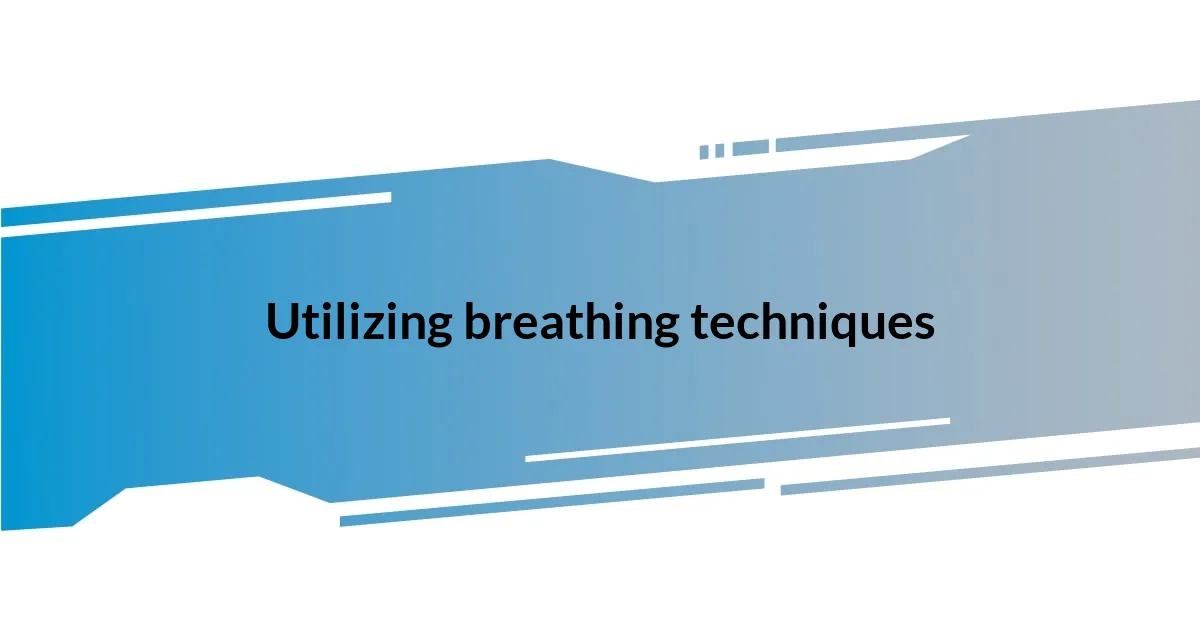
Utilizing breathing techniques
Focusing on breath control has been a game changer for me when facing stage fright. Before stepping onto the stage, I often find a quiet corner, close my eyes, and take deep, deliberate breaths. Inhaling slowly through my nose, holding it for a few seconds, and then exhaling through my mouth creates a rhythm that calms my racing thoughts. Have you ever noticed how a few deep breaths can suddenly clear your mind? It works wonders for maintaining your composure.
The 4-7-8 breathing technique, which involves inhaling for four seconds, holding for seven, and exhaling for eight, has become part of my pre-performance ritual. Don’t underestimate its power! I vividly remember using this technique during a particularly nerve-wracking meeting. As I focused on my breath, my heart rate slowed, and I felt a wave of confidence wash over me. I emerged from that moment with a clear mind and ready to tackle whatever was thrown my way.
Sometimes, even a simple five-second breathing pause can make a world of difference. In moments when I felt overwhelmed, I’ve taken a second to close my eyes, breathe in deeply, and exhale the tension away. It may sound trivial, but this practice has often reminded me that I’m in control. Don’t you think it’s incredible how something as fundamental as breathing can empower us to overcome anxiety? Engaging with these techniques has truly transformed my approach to stage fright, allowing me to center myself when it matters most.
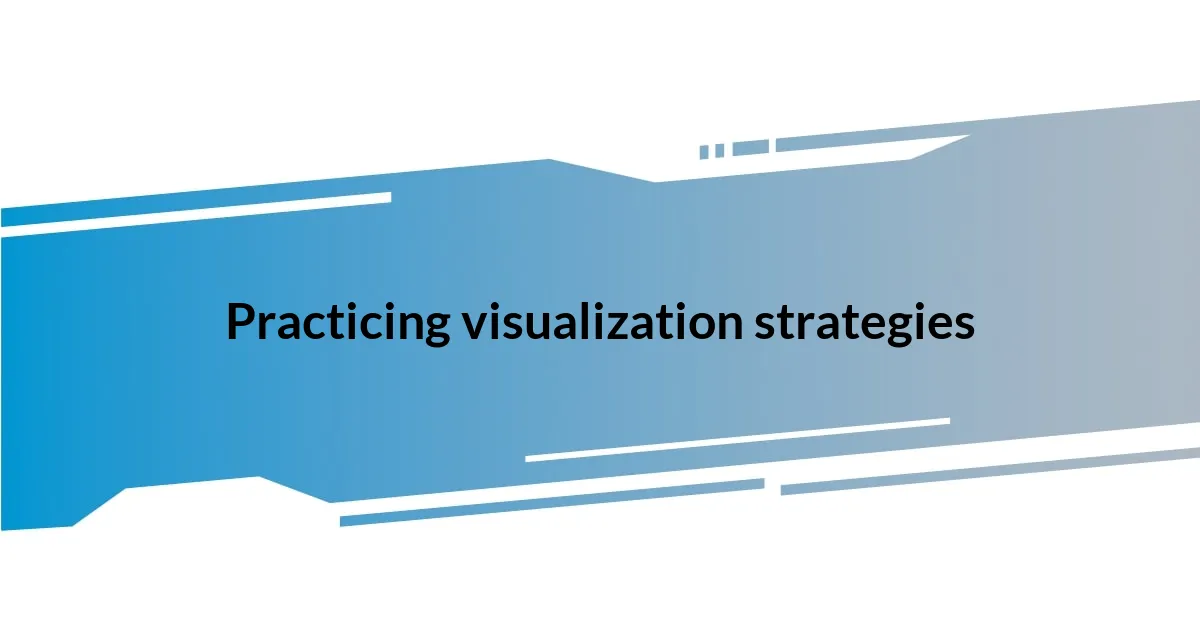
Practicing visualization strategies
Visualization strategies have played a pivotal role in my journey of overcoming stage fright. I often find myself in a quiet corner, mentally rehearsing each aspect of my performance. Picture this: I close my eyes and visualize not just myself on stage, but also the audience’s smiles and nods of approval. This practice transforms an intimidating scenario into a vivid, supportive environment. Have you ever imagined a moment going perfectly? It makes the real thing feel far less daunting.
What really struck me during my visualization practice was the emotional presence it brings. I vividly recall the first time I visualized succeeding in a presentation—it was a defining moment for me. I imagined the applause at the end, the positive energy flowing through the room. That visual created a sense of anticipation and excitement, which overshadowed my nerves. Isn’t it amazing how our minds can play such a key role in shaping our emotional states?
Beyond just seeing it in my mind, I’ve learned to engage all my senses for a more immersive experience. For instance, as I visualize, I listen to the sound of my voice resonating and focus on the warmth of the stage lights on my skin. By doing this, I not only prepare myself mentally but also emotionally. It’s like rehearsing not just for the performance, but for the joy of sharing a message. Have you explored how visualization can enrich your performance experience? I truly believe it’s about making that mental picture as vibrant and real as possible.
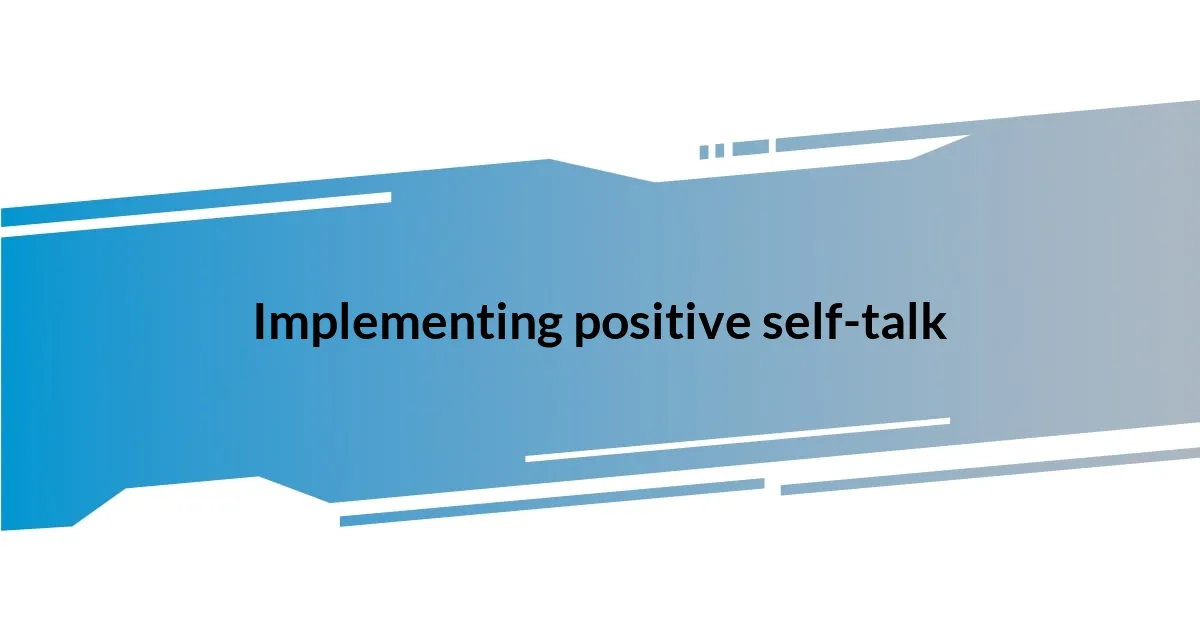
Implementing positive self-talk
Implementing positive self-talk has been a crucial strategy in countering my stage fright. I often catch myself in the moments leading up to a performance, whispering affirmations like, “You’ve prepared for this,” or “You’re going to shine.” This simple practice of speaking kindly to myself has transformed moments of doubt into confidence. Have you ever stopped to consider how your inner voice can shape your reality?
One memorable instance was before a large speech where I felt the familiar flutter of nerves. Instead of succumbing to anxiety, I told myself, “This is an opportunity to connect.” Instantly, I felt a shift in my mindset. I wasn’t just a speaker; I was a storyteller sharing something meaningful. Don’t you think reframing our thoughts can unleash a hidden strength?
Over time, I’ve crafted a mantra that truly resonates with me: “You are enough, and you belong here.” Repeating this to myself helps ground my thoughts, especially when nerves try to take over. I recall a time when I faced a room full of experienced professionals. Instead of shrinking back, that mantra reminded me that I had valuable insights to share. How powerful is it to realize that self-encouragement can transform fear into fortitude? Each performance becomes less about the fear of judgment and more about the joy of sharing my voice.
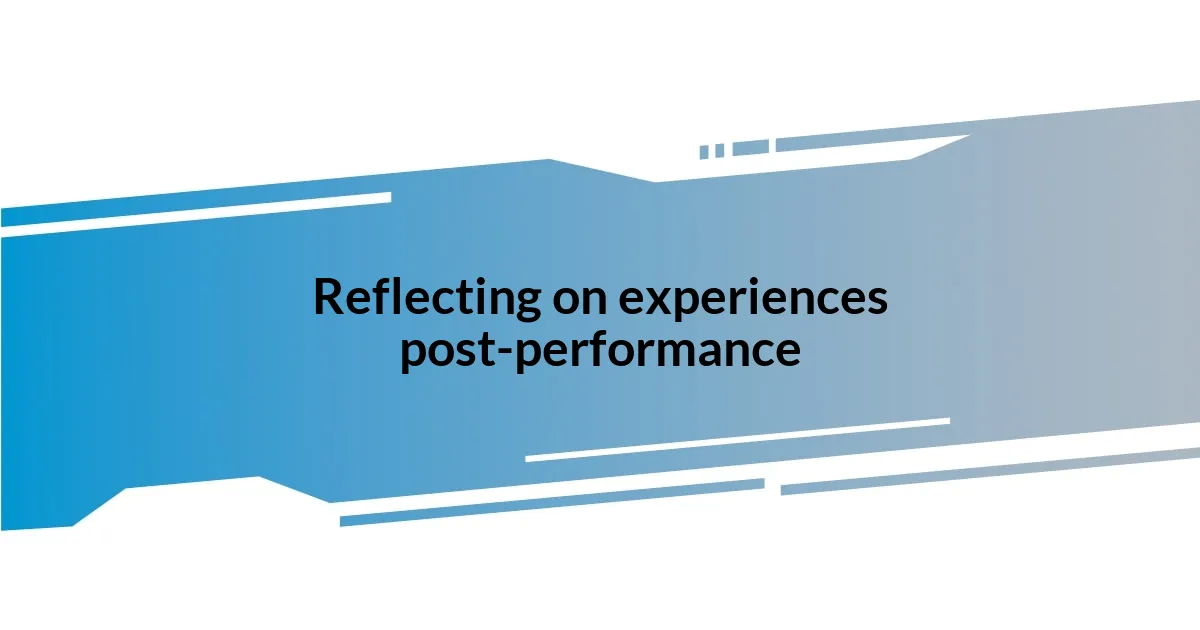
Reflecting on experiences post-performance
Reflecting on my experiences post-performance, I’ve come to appreciate how essential this phase is for growth. I distinctly remember stepping off stage after a challenging presentation, still buzzing with adrenaline and a twinge of disbelief. It was during this time that I realized, whether I nailed it or stumbled, acknowledging how I felt afterward helped me learn and evolve. Have you ever paused to assess your emotions after a performance? It can be eye-opening.
One night, after an event that had me on the edge of my seat, I sat down to journal my thoughts. The exhilaration of sharing my message mingled with a sense of vulnerability. I noted everything—the laughter, the moments of silence, and the questions posed by the audience. By capturing my feelings and observations, I gained clarity and made sense of what worked and what didn’t. Isn’t it fascinating how reflection can turn fleeting moments into valuable lessons?
As I review my performances, I often find recurring themes in my emotions and feedback. For instance, I noticed that moments where I connected with the audience brought me sheer joy, while times I felt disconnected were uncomfortable. This self-awareness has led me to dive deeper into understanding my audience, making each subsequent performance even more engaging. Reflecting never feels like an end, but rather a pathway to continuously refine and enrich my approach. How do you think reflection can empower your next performance?